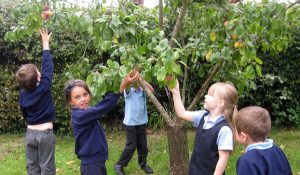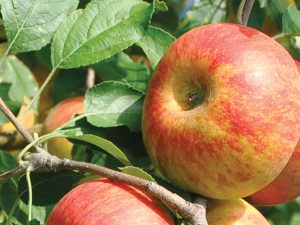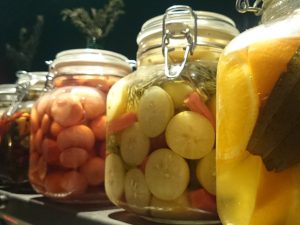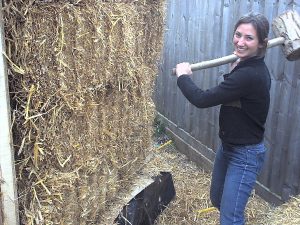Brighton Permaculture Trust are Scaling Up the Scrump – and need your help to make it happen!
For several years we’ve been turning waste fruit from local orchards and people’s homes into delicious produce such as jam, chutneys, and juices at pop-up scrumping events.
But now we’re building a Fruit Factory in an old tractor shed in Stanmer Village, just outside Brighton.

To scale up the scrump in a sustainable way, to house fruit processing kit, and have a beautiful venue and educational space it was important to create a permanent hub, for the community too. To make The Fruit Factory a reality, we, the Brighton Permaculture Trust need to raise £12K in 30 days.
Wanting to use natural resources, straw bale from nearby Burgess Hill made perfect sense. With their high insulation value and load bearing quality, straw bales (baled-up dead plant stems of a grain; not to be confused, or used, with hay which still has the seeds and flowers!) stack multiple functions.
The cosy, warm feel of straw bale builds was an important consideration too. The Fruit Factory is going to be a lively venue with people coming and going on those potentially cold apple harvest and gathering days.

Located in an old tractor shed in Stanmer Park the straw bale renovation began last summer when we ran a series of straw bale building courses. Bringing together experts with a team of volunteers and course participants one of the special things about the first part of the build was its inclusivity. In many cultures, especially in the US, where straw bale was pioneered in the mid west in the 19th century, the idea of “barn raising”, or a community collective build, was common practice.
Straw bale constructions are durable, energy efficient and environmentally sound. Fun too. Straw bale building expresses the qualities of natural building and echoes the best bits of community. Natural building is not exclusive. We run an intensive three day course that is open to all. More accessible than conventional building practices, students are able to pick up the skills and confidence with the guiding hand of a tutor. The natural building approach in this sense is much more open.

The simplicity of such a technique also appeals to the DIY ethic of many of our course participants and active volunteers. Here’s one of our students who went on to build this after doing a course with us.
Straw bale, like other natural building styles such as cob, rammed earth, adobe, affords space for a more human approach. It brings together skilled and experienced practitioners with students seeking to build new skills and confidence.

Needless to say such buildings are healthy places to occupy. Cheap too. Much cheaper than bricks. As straw is a natural (and renewable) material, Brighton Permaculture Trust’s decision to go with such an approach for The Fruit Factory means we’re avoiding the massive carbon emissions of cement – both in the embodied energy of its creation and in its continued release throughout its life. Straw bale building has featured recently on the BBC, its effectiveness plain to see to the mainstream construction industry.
Right now the Fruit Factory stands half built. With the bales in place there’s more to do. Brighton Permaculture Trust need to raise the funds to complete the building by installing windows, doors, roofing, rendering, and connection to services.

To do this, we’re reaching out to the local community using crowdfunding. They need to raise £12,000 in 30 days.
If you’d like to learn more and help raise the funds to finish this unique building then please consider donating, tell your friends, families, and local networks to help get the Fruit Factory up and running. brightonpermaculture.org.uk/fruitfactory.
You can follow Brighton Permaculture Trust on Facebook and Twitter. The crowdfunding campaign is live here.














